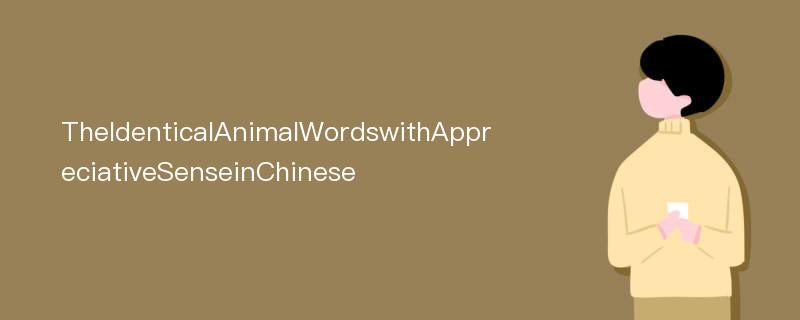
butDerogatorySenseinEnglish
河北省涿鹿县希望中学刘畅
【中图分类号】G242.36【文章标识码】B【文章编号】1326-3587(2013)06-0168-02
ThenumberoftheanimalwordswhichhaveentirelydifferentemotionalcolorinEnglishandChineseisquitelarge,thepresentexampleslikedragon(龙),bat(蝙蝠),magpie(喜鹊),fish(鱼),vulture(雕),goat(山羊),sheep(羊),whiteelephant(白象),petrel(海燕),bull(牛),cuckoo(杜鹃),cat(猫)mayendowthepointwithsomelight,whichhaveappreciativesenseinChinesebutderogatorysenseinEnglish
1.Dragon(龙)
DragoninChinesehistoryisatotemimagethatcangivepeopleblessedness,whichsymbolizessacrednessandauspiciousness,alsoauthority,rarenessandfeudalkings.Justlikewhathasbeenmentionedintheformerpartofthethesis,theanimalword“dragon”isendowedwithappreciativesenseinChinese.However,itisoppositeinEnglish.Dragon,ananimalonlyfoundinthefairytale,means“amythicalmonstertraditionallyrepresentedasagiganticreptilehavingalion'sclaws,thetailofaserpent,wings,andascalyskin”(一种传说中的怪物,一般被描述成有狮爪、蛇尾、翅膀及带鳞的皮肤),andstandsfortheSatanthatiscalledtheolddragon(魔鬼、撒旦)inBible,andevilinEnglish.Thedragonishwomanisalsocalled"dragon"inEnglish.Forexample:Sheisarealdragon,youhadbetterkeepawayfromher.Furthermore,dragon’steethmeans“therootofthewar”(相互斗争的根源);(Eugene,1993)Dragonnademeans“militaryforcepersecution”(武力迫害)andsoon.Consequently,inEnglish,thedragonisalwaysusedasaflag.Wecanseethewesternersdonotlikedragonatallfromtheseexamples.Asaresult,theanimalword“dragon”isendowedwithderogatorysenseinEnglish.Inaddition,duetotheemotionalcolordifferencebetweenEnglishandChinese,intermsofthetranslation,Chinese“望子成龙”cannotbetranslatedinto“toexpectone’ssontobecomeadragon”,but“tohopeone’ssontohaveabrightfuture”inEnglish;“亚洲四小龙”cannotbetranslatedinto“fourdragons”,but“fourtigers”inEnglish(Eugene,1993).
2.Bat(蝙蝠)
Whentalkingabout“bat”,Chinesepeoplewouldassociateitwithcommendatorymeanings,whichattributestothefactthattheword“bat”andthecounterpartChinesecharacter“福(blessing)”arehomophones.“Bat”isacknowledgedasthesymbolofgoodluck,happiness,health,andlongevityinChineseculture.Intermsofthelegends,“bat”willbecomewhitewhenlivingthroughonethousandyears,andwillhangitselfonthebrancheswithitsheaddownwards;peoplewhoeatthiskindofbatwillhavelongerlives.ThelegendmaysafelygiveanexplanationaboutwhyChinesepeoplehang“福”upsidedowninSpringFestivalcouplets.Moreover,aredbatistheomenofbeingauspicious,fortheletters“红蝠”and“洪福”arepuninsounds.Nevertheless,toEnglish-speakingpeople,“bat”isanevilanimal,andalwaysassociatedwithevilandugliness.Consequently,expressionswith“bat”havederogatorymeaningsinEnglish,e.g.,“asblindasabat”(有眼无珠);“havebatsinthebelfry(异想天开);“crazyasabat(发痴)”;“Hedashedaroundlikeabatoutofhell(他发疯似的横冲直撞)”.(HeYanfang,2001)Therefore,theanimalword“bat”hasappreciativesenseinChinesebutderogatorysenseinEnglish.
3.Magpie(喜鹊)
Tobeginwith,inChina,amagpiesymbolizesgoodluck,andpeoplebelievethatamagpie’ssingingcanbringgoodnews.Onthecontrary,inEnglish,theyusuallysymbolizebadluck.InsomeplacesinScotland,ifamagpiefliesnearawindow,itisasymbolofbadluck.Furthermore,inastateofEngland,ifsomeonecomesacrossamagpie,hehastospitthreetimestoavoidbadluck.AlsoinEnglish,amagpiecanbeusedtorefertothosewhochatter,forexample,“Sheisamagpieofawoman”;“Shekeptmutteringlikeamagpie”.Owingtotheseabove,theanimalword“magpie”hasappreciativesenseinChinesebutderogatorysenseinEnglish.
4.Fish(鱼)
InChinese,“鱼”and“余”havethesamepronunciation,andthesupperofNewyear'sEveinChinacannotberegardedastherealdinnerwithoutfishfor“鱼”means“年年有余”.Asaresult,“fish”hasaverywonderfulmeaningwithappreciativesense.However,inEnglish,“fish”hasderogatorysenseandisusedtodescribethebadthingandbadperson,onthebaseofwhich,“apoorfish”,“aloosefish”,“fishintheair”shouldbetranslatedinto“可怜虫”,“生活放荡的女人”,“水中捞月”(Eugene,1993).
5.Vulture(雕)
InEnglish,“vulture”isalwaysconnectedwiththeinsatiabletogetherandassociatedwithderogatorysense.Evenso,inChinese,thevulturehasagoodfame“翱翔长空”,whichsymbolizesthefierce,vigorousandforethoughtfulwithappreciativesense.
6.Goat(山羊)
ToChinesepeopleandEnglishpeople,“goat”hasquitedifferentassociationsandemotionalcolors.Inchina,peoplewoulduse“goat”torefertothosewhoareofgreatlearningandgreatability.So,intheirview,theanimalword“goat”hasappreciativesense.Onthecontrary,inEnglish,“goat”inderogatorysense,meanslady-killerandreferstothosepersonsbehavingfrivolouslyorirresponsibly,e.g.,“Letgo,yourandyoldgoat!”
7.Sheep(羊)
Theanimalword“sheep”isthesymbolof“theidiot”inEnglish.TheEnglishphrase“makesheep’seyesatsome-one”means“用愚笨的眼光看人”inChinese.ButinChinese,“sheep”isrelatedto“thetender,lovelyandkindhearted”.Forinstance,“可怜的小绵羊”、“替罪羊”.
8.WhiteElephant(白象)
Asisknowntoall,“whiteelephant”referstothepreciousandpropitiousthinginChinese.Nonetheless,itmeanstheexpensivethingwithoutthepracticalvalueinEnglish.Basedonthis,iftheinstantnoodlesnamed“白象”istranslatedinto“whiteelephant”inEnglish,itcannotbecomeabest-sellerinEnglish-speakingcountriesbecause”whiteelephant”hasappreciativesenseinChinese,butderogatorysenseinEnglish.
9.Petrel(海燕)
Whenitcomestotalkingabout“petrel”,theChinesewouldconsideritasasymbolofawarriorbravinghardshipsandadversity,andadvancingwithperseveranceandcourage.Furthermore,“petrel”ispronouncedas“HaiYan”inChinese,inotherwords,“petrel”and“HaiYan”arehomophones.Therefore,therearealotofgirlsnamedas“HaiYan”-“petrel”(Claire,2000).However,“petrel”oftengetsunfairnamesinEnglish,itisconsideredasanomenofdisasters,thereasonwhyEnglish-speakingpeopledislike“petrel”andregarditasthesymbolfordisastersisthat,whenastormisarising,“petrel”willflushandflylikelighteningbetweenblackcloudsandthesea.Inaddition,“petrel”canalsorefertothosewhoincurtroubles,e.g.,“stormypetrel”means“personwhosepresenceseemstoattracttrouble(OxfordAdvancedLearner’sEnglish-ChineseDictionary,2002)”.Duetothesepointsmentionedabove,“petrel”isendowedwithappreciativesenseinChinese,butderogatorysenseinEnglish.
10.Bull(牛)
Chinaisalargeagriculturalcountrywith4700years’historyofgrowingrice.Chinesepeoplehavebeenusingthebullinfarmingforthousandsofyearsfromgenerationtogenerationsotheyhaveagreataffectionforthebull.Furthermore,“bull”isusedtodescribethepersonwhoisreadytocontributehispowertoothers.Ahardworkingpersoniscalleda“老黄牛”.LuXun’ssayingof“俯首甘为孺子牛”isknowntoalmosteverybodyinchina.“孺子牛”iscomparedtotheonewholikesservingthepeopleheartandsoul(WanQi&ZhouSu,2007).Therefore,“bull”hasappreciativesenseinChinese.Onthecontrary,inEnglishview,thebullhassomanybadpoints.Forinstance,“abullinachinashop”(鲁莽闯祸的人);“likeabullatagate”(狂怒凶悍);“throwthebull”(胡言乱语).Besides,“calf”(牛犊)meansaidioticyoungman;“cow”(母牛)meansafatanduglywoman;“buffalo”(水牛)meanscheatingsomeone.AlloftheexpressionsmentionedabovehavederogatorysenseinEnglish.
11.Cuckoo(杜鹃)
ToChinese,“cuckoo”singsitsfirstsongmeansspringisapproaching,so,Chinesepoetseulogizeitforitsabilitytotellpeoplespring’sapproachwithappreciativesense.However,westernersholddifferentattitudestowardsit,andendowitwithderogatorysense.Forexample,itissaidtobeinauspiciousthatonehearscuckoo’ssingingbeforeAprilthesixth.Therearequiteafewsuchparlances.Anotherexample,whenacuckoosings,oneslookingaround,whichmeanshehasonlyoneyearlefttolive.
12.Cat(猫)
ThecatisverypopularinChinabecauseitisnotonlyclearbutalsolivelyandcute,besideswhich,itcanbeagoodcompanionofhumanbeingsandaperfectsharp-shooteragainstmice.Whatismore,“猫”and“耄”havethesamemeaning,thatis“longevity”.Onthebaseoftheseadvantagesofthecat,itisendowedwithappreciativesenseinChinese.But,intermsofthelegend,thecatstandsfortheevilinEnglish,especiallytheblackcat.Forinstance,“Sheisacat”.(她是一个邪恶的女人).(ZhangJunxia,2007)“Thecatshutsitseyeswhenstealingcream”(掩耳盗铃)、“Thecatoutofthebag(泄漏秘密)”.“Likeacatonhotbricks(像热锅上的蚂蚁)”.
